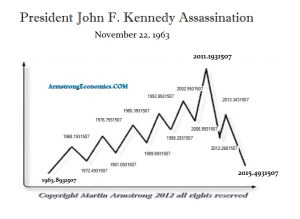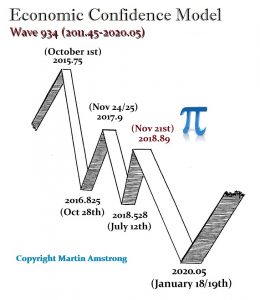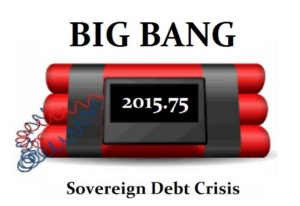Posted Jan 9, 2020 by Martin Armstrong
The year 2022 is showing up as a political change in trend. That often implies a change in leadership. Since that is not a year where a presidential election would take place, given the extreme hostility which has emerged politically and the end of bipartisanship in Washington, there is the potential for the merger of violence with the political change in trend. The last time such a Directional Change showed up was November 1963.
Now look at the bottom of the Kennedy Assassination wave, which was 2015.49 and the peak in the ECM wave itself was 2015.75. Our political model called for the first time a possible third party candidate would win was 2016. We had also warned that 2015.75 was the PEAK in government, but not just the USA, this was on a global scale. The Refugee Crisis in Europe began with Merkel opening the doors to Europe first on August 25, 2015, when she chose to allow Syrian refugees who had already registered elsewhere in the European Union to enter Germany and register there. This temporarily suspended an EU law that requires asylum seekers to be returned to the first country they entered.
Then on Friday, September 4, 2015, Merkel relaxed controls on the border with Austria, allowing tens of thousands of refugees stranded in Hungary to enter Germany. This began Merkel’s so-called open-door refugee policy where she condemned the entire European project. Her actions showed that a single leader of a single EU state could alter the policy of Europe as a whole demonstrating that EU member states became irrelevant.
Then 2015.75 was the start of Big Bang, and indeed interest rates went negative in Europe just before that target and going into 2020 there are now $17+ trillion of negative-yielding European debt. The pension crisis has been building ever since both public and private. In Germany, not only are pensions negative but now the for the first time since 2015, statutory health insurance companies recorded a deficit. In Germany, there is a rising political debate about the relevance of the deficit, but it is clear that contributions are likely to increase significantly in the long-term as premiums are raised




No comments:
Post a Comment